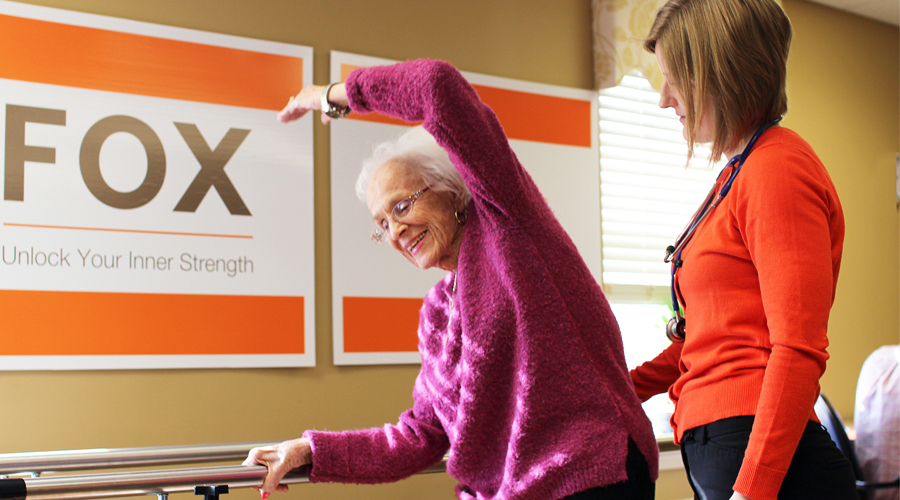Therapy’s Potential Through FOX Rehabilitation’s House Call Model

By Colleen Bowman, PT, DPT, GCS
Physical Therapist
The geriatric population is booming. And yet many older adults are not aware of the potential resources available to help them age well. It is our duty as physical therapists to educate our patients and our communities about the benefits of physical activity and the impact it can have on maintaining physical function as we age.
When I was a physical therapy student, I was unsure what to expect from geriatric house-call patients. I thought of this patient population as those who had suffered a stroke or were recovering from a total joint replacement. And now, working with FOX Rehabilitation, I know that at times our services are summoned after an event like those, but to my surprise a lot of the care I provide is more proactive.
Frequently people are referred to FOX when their physician notices changes in their gait or balance. This gives us physical therapists an opportunity to prevent injuries before they occur through improving areas of weakness.
Working with older adults in the home can be so much more than major recovery assistance. There can be proactive care, the creation of a safe environment, optimal function goal orientation, and ultimately part of the fight against ageism.
THE OUTPATIENT HOUSE CALL ENVIRONMENT
One of the greatest benefits of being a FOX clinician is to be able to work with older adults one-on-one in their own homes. Each patient functions in a completely unique environment – one that is authentic to their daily lives
In an outpatient clinic, floors are flat and smooth. Spaces are open and well lit.
Treating in the home allows us to see what challenges our patients are truly facing and make appropriate changes or work with our patients to overcome them.
STRIVING FOR OPTIMAL LIVING
In the home health model of care, patients can be treated until they are no longer homebound; this often limits care and doesn’t allow for treatment of higher-level balance and gait dysfunction.
In outpatient house calls, I am able to work with my patients toward optimal function. I find that older adults who work with a physical therapist in their own home are motivated to remain independent and continue to do the things they love.
For example, a recent goal of one of my patients was to improve his balance and we did so by working on his ability to maintain his garden. We worked on balance training on uneven surfaces like grass, dual tasks such as carrying tools while walking, and standing up from the floor as simulation for getting up after weeding. Seeing my patient’s face light up as he showed me all of the work he was able to accomplish is what makes my job so rewarding. Getting older shouldn’t mean being forced to abandon the parts of life that bring us joy. Instead, we may just need to devote more time and effort to optimal function.
Another patient of mine lived alone and was unable to drive. His goal was to be able to walk to his physician’s office a few blocks away so he would not have to rely on anyone else for his transportation needs. We worked together on building his endurance safely while monitoring his vitals and level of exertion. By the end of our episode of care he had mastered walking on an incline and decline. On the day of his discharge, we walked all the way to the physician’s office. Independence is often a big factor at play in our work at FOX.
THE FIGHT AGAINST AGEISM
Often the patients themselves or their loved ones have low expectations of physical function solely based on stereotypes related to older adults. They say, “Remember my mom is 88 years old,” or, “Don’t forget, I’m an old man.”
Truthfully, I try to forget the age on the chart and remember to treat the person in front of me. It is my responsibility to properly challenge the patient in order for them to progress.
At the end of our work together , patients and family members always thank me for pushing them to do the things that were outside of their comfort zone because they recognize their growth – that they did in fact improve and build confidence as a result.
Looking at the big picture, an evaluation by a physical therapist should not occur only after a catastrophic event or major injury such as a fall. Geriatric patients that have had a functional decline due to disease or injury would benefit from an assessment of their home and how they are functioning there. If you are looking for a rewarding career opportunity, there is nothing more fulfilling than to help older adults achieve what they once thought impossible.
